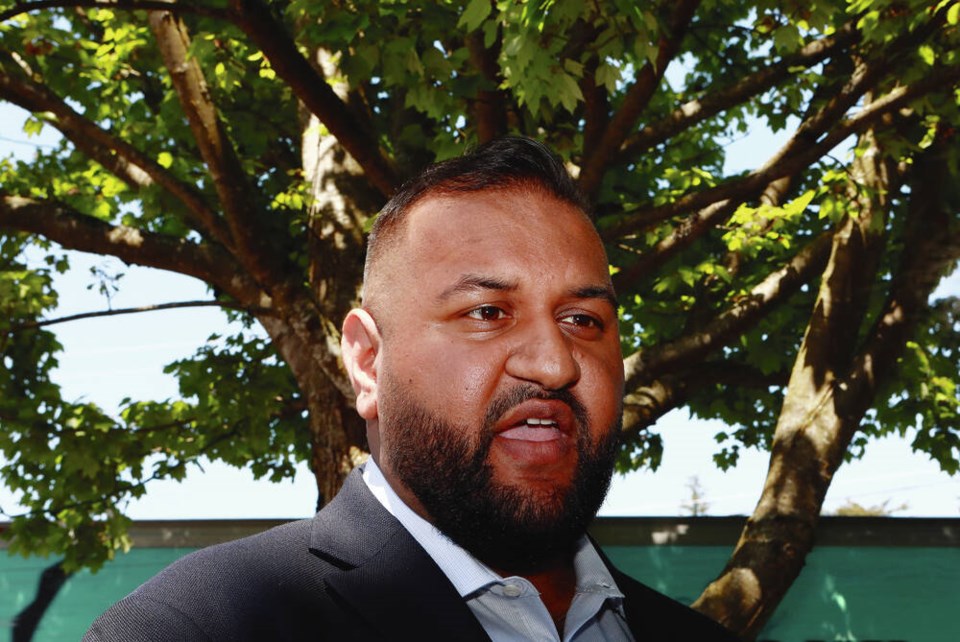The Trump administration’s focus on retribution against individuals and organizations that disagree with him may be curbing B.C.’s effort to rally U.S. protests against lumber price hikes.
Premier David Eby is talking to U.S. politicians about the issue — he had a virtual meeting with California Gov. Gavin Newsom on Monday.
But Forests Minister Ravi Parmar said U.S. organizations and businesses that will have to deal with higher lumber prices when the higher duties hit seem reluctant to speak up.
He told the legislature: “It’s hard to imagine a large democracy like the U.S. where … industry organizations were fearful of standing up because they didn’t want to get their heads cut off by the president.
“How crazy is that?”
He said Canadians are fairly critical of politicians and have lots of opportunities to make their feelings known. But he’s hearing about American interests “that would love nothing more than to join us in making the case to stand up for their building sector — but are afraid to do so. … It doesn’t bode well for democracy.”
Parmar said he hopes people get a chance to make their case known.
“They’re not going to be able to afford the homes that they need. They’re not going to be able to rebuild homes in southern California, in North Carolina and elsewhere.”
The U.S. government is imposing huge financial penalties against major universities that don’t follow President Donald Trump’s line on various social issues.
The threat of sanctions against major law firms that handled past cases against him has prompted several to reach deals with him. Last week, Trump ordered the Department of Justice to open investigations against employees who displeased him during his first term.
Those and other measures have prompted intense debate about the chilling of dissent. It might be making the U.S. interests with the most to lose from softwood countervailing duties nervous about objecting.
When Eby last week curbed dealings with U.S. interests, he exempted the Pacific Northwest Economic Region. That’s a 34-year-old organization of states and provinces devoted to maintaining the U.S.-Canada relationship. Eby said it would be useful to maintain a presence at those meetings.
The Trump tariff war and the new countervailing duties violate everything that body stands for.
But PNWER passed a resolution last month on the issue that is noticeably insipid.
It stressed the integrated economies and the “prosperous and exemplary relationship that is the envy of the world.” But the resolution omits any explicit criticism of the tariff, duty and annexation threats from Trump and simply urges the U.S. and Canada to “continue” to prioritize and strengthen their relationship.
It’s a relationship that Prime Minister Mark Carney, Eby and other Canadian leaders say is irretrievably broken now.
Parmar said: “All the steps he’s been taking… have been alienating his largest and most successful trading partner and friend, which makes absolutely no sense to me.”
Trump originally threatened a 25 per cent tariff on most Canadian goods, but amended it multiple times before settling on a 10 per cent levy. But then it was announced a separate duty on Canadian softwood lumber will jump to 34.5 per cent from 14.5 per cent, with more likely to come after a separate investigation into the “national security” risks of Canadian lumber.
“It’s crazy to think that our softwood lumber here in B.C. could somehow be a national security risk,” said Parmar. “Like, how ludicrous is that?”
The U.S. National Association of Home Builders has highlighted the downsides to consumers and objected to the tariff war and the duties. But it’s not the level of outrage that B.C. wanted to see when officials started warning about the huge costs Trump was imposing on his own citizens.
Eby said one of every 10 sticks of lumber in the U.S. comes from Canada. The U.S. National Association of Home Builders says it is more like one-quarter.
Just So You Know: Parmar also took a shot at Canadian lumber firms that have been buying up U.S. mills in recent years while curtailing B.C. operations. Some of them operate more in southern states than in B.C. now. It’s a newly sensitive issue in light of the trade war.
He said: “A lot of companies have benefited from B.C., made billions in profits and made decisions to go down south. … There are a lot of frustrated British Columbians who feel the social licence has been broken.”
>>> To comment on this article, write a letter to the editor: [email protected]




